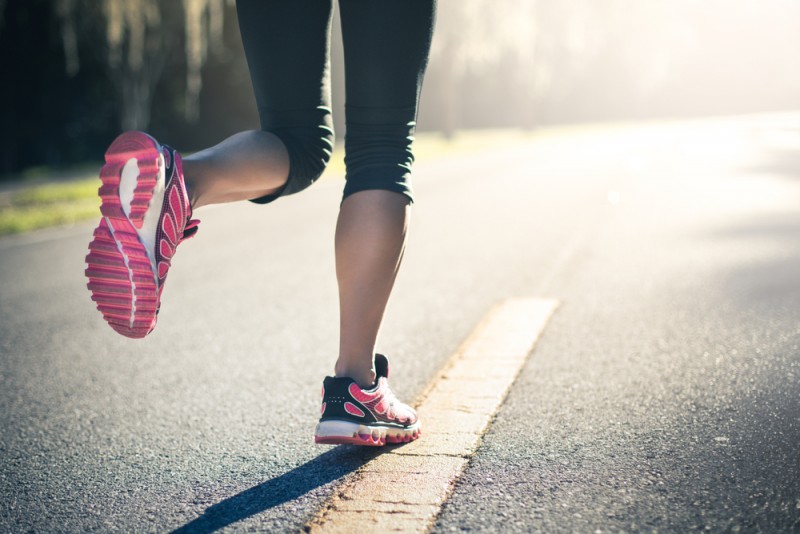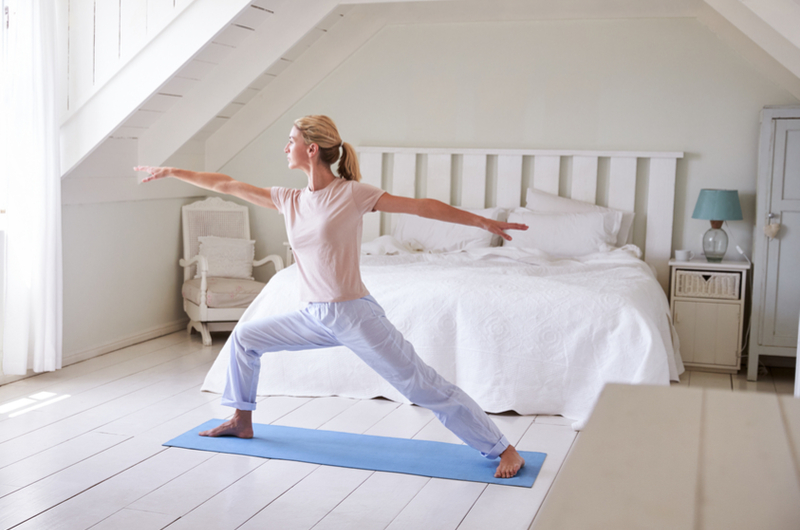Breaking Down Exercise and Sleep – A Recovery Guide
7 min read
Last Modified 22 July 2022 First Added 4 April 2018

A decline in core body temperature increases the likelihood of sleep onset and may help you enter deeper stages of sleep. The immediate drop in body temperature post-workout may actually mimic the body temperature changes before sleep and indicate to your brain that it’s time to sleep. It’s difficult to lower your core temperature when you’re dehydrated from endurance exercises. Dehydration also raises your heart rate, meaning no sleep for you. Hence, why we recommend rehydrating thoroughly before bed to get a good night’s sleep.
Many studies show how exercise affects the brain through neurotransmitters and hormones. For example, exercise increases our endorphin levels responsible for blocking pain and increasing pleasure. Dopamine, another neurotransmitter, that helps in the regulation of sleep cycles is also impacted by exercise. During exercise, we produce the stress hormone cortisol and fight-or-flight hormone adrenaline. This means the body stays hyped even after the race is over! Resultingly, after exercise, you may need to allow some time to reset and relax before jumping straight into trying to get your forty winks.
Whilst light is often cited as the most tangible regulator of our circadian rhythms, the internal body clock, exercise has also been found to have circadian shifting effects. This study found that exercising at 7 am or between 1 and 4 pm advanced the body clock to an earlier time, and exercising between 7 and 10 pm delayed the body clock to a later time. Exercising at a later time, therefore, will begin to push back your body clock meaning you may struggle to get to sleep at your normal bed time.
As it’s such an important topic, we gave it the Dr Pixie treatment and used how exercise affects sleep as a subject for our Sleep Matters podcast.
After a big race or heavy training session, sleeplessness can occur. This is also known as post-exercise insomnia. Here are some helpful tips on ways you can avoid it:

Firstly we need to understand what happens to the body during periods of physical exertion. In a brief scientific-literary nutshell, when you train at a high intensity, your oxygen usage skyrockets—as is evident from your heavy breathing. This causes a dramatic increase in lactic acid accumulation in the muscles — that burning sensation you get as you fatigue. This causes your body to pull alkaline reserves from bones and other mineral-dense sources. Equally, tiny micro-tears are formed in the muscles when you lift weights and the body’s molecular form of energy (adenosine triphosphate) becomes exhausted.
A minor muscle injury usually consists of a muscle pull, strain or tear. This occurs in the muscle fibres or in tendons and can damage small blood vessels. This causes local bleeding, bruising and irritating pain to nerve endings in the damaged area. Unfortunately, these injuries can easily occur during any form of physical activity such as sudden heavy lifting, gym sessions, and strenuous tasks within employment. The causes of minor muscle injury include anything from:
Needless to say, none of these is pleasant and any shock to the body is a risk. And, if your body does suffer a physical shock, signs of an injury include:
Obviously the worse the pain, the more severe the injury, and if the pain is unbearable you should consult a GP as soon as possible.
The reason sleep and muscle recovery are connected, and why sleep is helpful during the recovery process, comes down to growth hormones and blood flow. Growth hormones evidently stimulate growth, while aiding cell reproduction, cell regeneration and regulation of your body’s metabolism to literally repair you while you snooze.
When asleep, your general energy consumption is lowered as, most of the time, your body and brain are at rest. This means more energy can be used to restore your bones and muscles, both through an increase in growth hormone production and by an increase in blood flow to the area in need. The hormone prolactin is also released during deep sleep. Prolactin has anti-inflammatory properties and is known to help the recovery of achy joints.
To find out more about how your body recovers overnight, see our interactive graphic ‘What Happens To Your Body During 8 Hours Of Sleep’.
In a word, yes. This is because many of the repair and restore bodily functions occur during sleep. For example, growth hormones are released in the deep sleep phase of the sleep cycle, occurring roughly every 90 minutes. Quite simply, more time spent in this zone will lead to greater hormone secretion and greater levels of recovery for injured muscles, tendons and tissues.
You may find healing makes you tired and that you’re sleeping a lot after injury. This is completely normal. Injury and inflammation can be extremely painful and uncomfortable causing fatigue. Sleep and rest play a vital role in the recovery after injury and is key to helping your body heal.
During sleep, your body is very intelligent and heals any minor tears which occur in the muscles during the day. Without adequate sleep, you get behind in your healing and problems build up. Sleep loss can even lead to cell damage. You may be wondering how many hours of sleep should you be getting at night? As each individual is different, there is no specific amount of time. However, the recommended amount of sleep for an adult every night is around 7-9 hours. If you use this time guide as an aim each night, your body should have sufficient time to help heal injuries.
This is perhaps best illustrated by a study conducted at the Stanford Sleep Disorders Clinic and Research Laboratory at Stanford University, USA which examined the effect prolonged sleep had on elite basketball players’ performance. Researchers instructed six basketball players to obtain as much extra sleep as possible following two weeks of normal sleep habits. A quicker sprint time and a 9% improved free-throw accuracy were recorded following the prolonged sleep period. Subjectively, athletes also reported better mood states (not surprisingly related to neurotransmitters) noting an increased sense of vigour and decreased sense of fatigue.
Interestingly, although still with a small number of test subjects, the same group of scientists also increased the sleep time of swimmers to 10 hours per night for six to seven weeks and reported that in the 15-metre sprint, reaction time, turn time and mood all improved. This led to the conclusion that increasing the amount of sleep an athlete receives may significantly enhance performance.
Below you’ll find an infographic, with our tips and tricks for better post-workout sleep and the reasons why it’s so important to do so if you want to see some gains.
